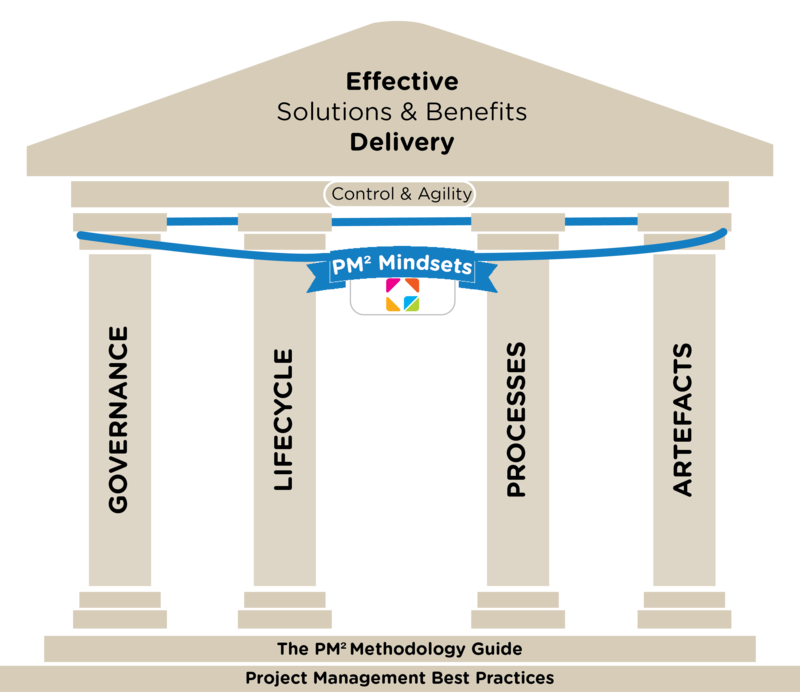PM² is a project management methodology developed by the European Commission. Its main purpose is to enable project managers to provide solutions and gain benefits for their organisation by effectively managing the entire life cycle of their projects. PM² was created to serve the needs of the European Union, but is adaptable and tailorable to any organisation and any project.
The PM² Project Management methodology is known for its flexible approach and lean aspects. It is a light methodology that is easily tailored to your organisation. This is a unique approach to project management, but there is one thing that is included in the methodology that makes it even more unique: the mindsets. Marc Berghmans, Project Management expert and PM² Ambassador of the European Commission, believes that it is the mindsets that make the PM² Project Management Methodology stand out.
Scope of the the PM² mindsets
PM² Mindsets are the attitudes and behaviours that help project teams focus on what is crucial to achieve their goals. These mindsets provide a foundation for approaching projects and guiding decision making. The Mindsets offer PM² a personality with which PM² Project Managers can associate with and reinforce their sense of community. The mindsets:
- Help navigate through the complexities of project reality
- Help reposition the perspective and enhance the view of the project goals within a wider project and organizational context
- Are useful reminders of effective attitudes and behaviours
- Remind project managers of what is important for their success
- Become the glue that hold together the PM² processes and practices
- Provide a common set of beliefs and values for all PM² Practitioners
- The mindsets remind those that use the PM² Project Management methodology of productive attitudes and behaviours. Together with the PM² processes, artefacts, tools and techniques they offer a methodology that makes project management more effective and complete.

The PM² Mindsets
The PM² Mindsets for project teams that practise PM² are:
- Apply PM² best practices to manage their projects
- Remain mindful that the methodologies are there to serve projects and not the other way around.
- Maintain an outcomes orientation in relation to all projects and project management activities.
- Become committed to delivering project results with maximum value rather than just following plans
- Foster a project culture of clear communication and effective collaboration
- Assign Project Roles to the most appropriate people for the benefit of the project
- Balance in the most productive way the project management “Ps” of: product, process, plan, people, pleasure, pain, participation, perception and politics
- Invest in developing their technical and behavioural competencies to become better project contributors
- Involve project stakeholders in the organisational change needed to maximise project benefits
- Share knowledge and lessons learned, and contribute to the improvement of project management within their organisations
- Draw inspiration from the PM2 Guidelines on Ethics and Professional Virtues
PM² Mindsets and Infrequently Asked Questions (IAQs)
Closely linked to the PM² Mindsets are the Infrequently Asked Questions. These are a set of thought-provoking questions aimed at challenging assumptions, uncovering hidden risks and stimulating critical thinking within project teams. The PM² mindsets and the IAQs are not directly connected, but they complement each other. By embracing the mindsets, project managers create a mindset conducive to asking IAQs and actively seeking answers that may otherwise be overlooked. The combination of the PM² Mindsets and IAQs contributes to improved project outcomes and enhanced project management practices.
The PM² Infrequently Asked Questions are:
- Do we know what we are doing?
- Do we know why we are doing it? Does anyone really care?
- Do we know who is doing what?
- Deliver at any cost or risk?
- Is this important?
- Is this a task of “them” or for “us”?
- Should I be involved?
- Have we improved?
- Is there life after the project?
Are the PM² Mindsets similar to PM Softskills?
Seeing the PM² Mindsets for the first time, they might remind professionals of a set of soft skills. However, the mindsets and soft skills are not the same, they are complementary. The PM² Mindsets should be adopted by Project Managers to be effective in their roles. PM soft skills serve more to help Project Managers lead and manage their projects.
While there is some overlap between the PM² mindsets and project management soft skills, the mindsets focus more on the underlying attitudes and perspectives that project managers should cultivate, while soft skills encompass a broader range of interpersonal and communication skills. Both are equally important to reach a Project’s objective.
QRP International organises training courses on PM² Project Management methodology. QRP is part of the PM² Group, a not-for-profit membership organisation that strives to facilitate the implementation of the PM² project management methodology in public and private projects as intended by the Center of Excellence in PM² of the European Commission.
QRP International organises PM² Foundation courses, both on-site and virtual. Ask us for more information or watch our recorded webinar for free.
Sources:
PM² Mindsets infographic
PM² Mindsets and IAQ leaflet









